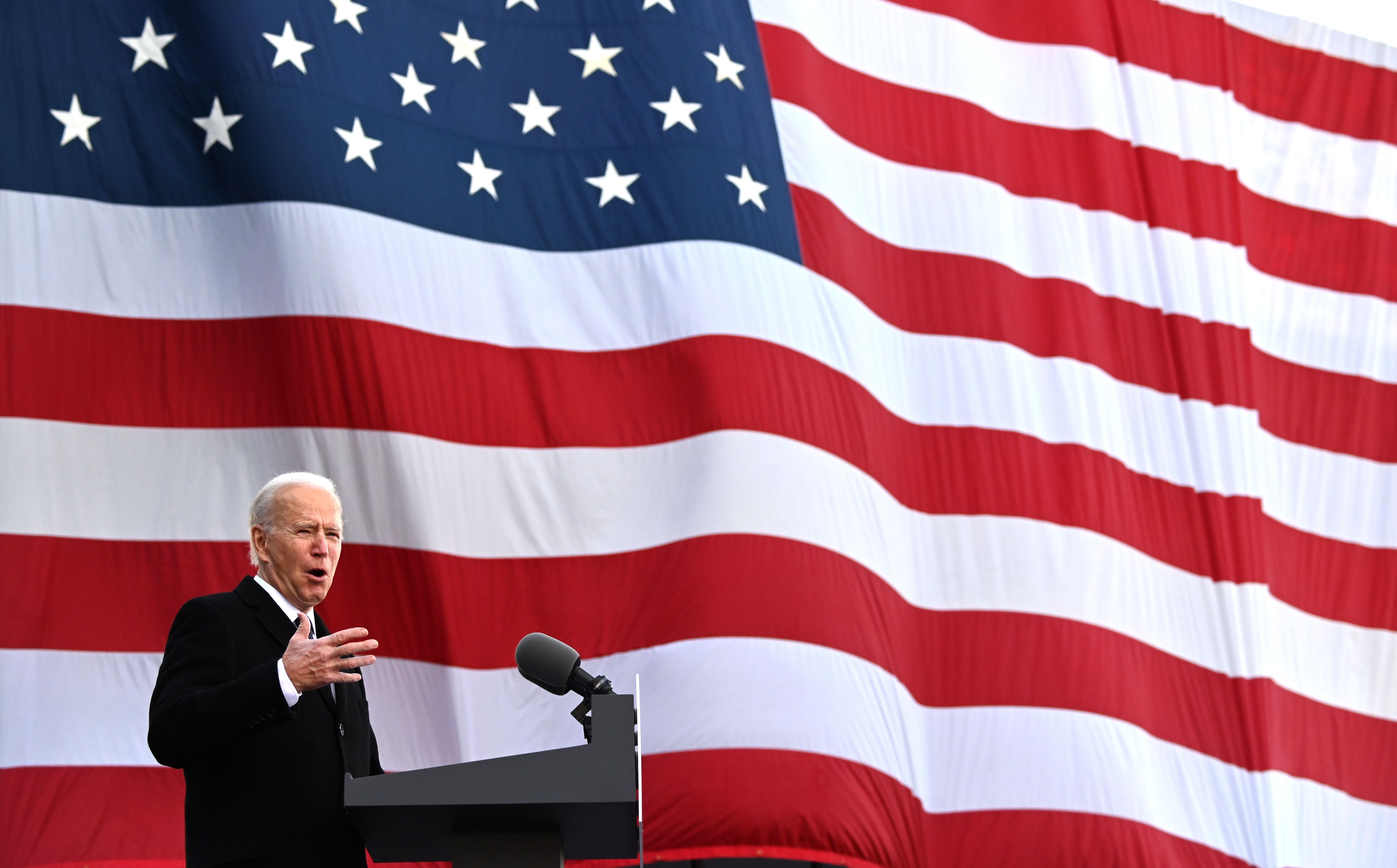‘At least 22 killed’ after President Biden orders first military strike
The attack was carried out on Iranian-backed militias

Your support helps us to tell the story
From reproductive rights to climate change to Big Tech, The Independent is on the ground when the story is developing. Whether it's investigating the financials of Elon Musk's pro-Trump PAC or producing our latest documentary, 'The A Word', which shines a light on the American women fighting for reproductive rights, we know how important it is to parse out the facts from the messaging.
At such a critical moment in US history, we need reporters on the ground. Your donation allows us to keep sending journalists to speak to both sides of the story.
The Independent is trusted by Americans across the entire political spectrum. And unlike many other quality news outlets, we choose not to lock Americans out of our reporting and analysis with paywalls. We believe quality journalism should be available to everyone, paid for by those who can afford it.
Your support makes all the difference.A set of American airstrikes targeting an Iraqi militia way station in Syria overnight was meant as a calibrated and proportionate response to rocket attacks on United States facilities this month which left one person dead.
But the strikes may have killed at least 22 people, according to a monitoring organisation, potentially prompting an unexpected blowback against the first military action ordered by president Joseph Biden.
The US early Friday launched half a dozen missiles on a Syrian site it described as depots used by Kataib Hezbollah and Kataib Sayid al-Shuhada, two Iranian-backed Iraq militias it claimed were behind a deadly 15 February attack on an American base in northern Iraq and another 22 February attack on its embassy in Baghdad.
While the Pentagon described the airstrikes as a “proportionate military response”, the high reported death toll, if confirmed, could have unintended consequences both for the fragile Iraqi government of prime minister Mustafa al-Kadhimi and Washington-Baghdad relations.
None of those killed in the attack were Iranian, said the Syrian Observatory for Human Rights (SOHR), a generally credible monitoring group based in London. So many deaths could prompt cries of revenge by the Iraqi militiamen’s comrades or extended families or tribes, possibly imperiling the moderate, pro-western Kadhimi government in Baghdad.
According to SOHR, the airstrikes unfolded early morning local time, targeting a weapons shipment crossing from Syria into Iraq near the border crossing that separates near the Iraqi town of al-Qaim. US officials told reporters the military dropped seven 500-pound bombs on a cluster of buildings along the Syrian-Iraqi border.
“The airstrikes have left great human and material losses,” said a report by SOHR, specifying the destruction of three trucks loaded with ammunition. A source told Reuters that 17 people were killed in the airstrike, while a militia member told the news agency that at least one person was killed.
The US said the attack was launched in conjunction with “diplomatic measures, including consultation with coalition partners” that may include the UK and France.
“The operation sends an unambiguous message: President Biden will act to protect American and coalition personnel,” said the Pentagon statement. “At the same time, we have acted in a deliberate manner that aims to de-escalate the overall situation in both eastern Syria and Iraq.”
Iran provides financial, military and political support for powerful and often highly ideologically motivated Iraqi armed groups that are often rooted in similar strains of populist Shia Islamism as the leadership in Tehran. The groups, officially called Popular Mobilisation Forces, have grown more politically powerful since taking up a fighting role in the five-year war to dislodge Isis from Iraq and Syria.
Both Israel and the US have occasionally targeted the Iranian-backed militias, which extend Tehran’s influence and power and are seen as a major threat by Arab autocracies aligned with the US.
Washington and Tehran are now seeking to re-engage in diplomacy and resurrect a deal curtailing Iran’s nuclear programme after four years of sour relations under president Donald Trump but have been hampered by mistrust.
Hours before the airstrikes, Mr Biden held his first phone call as president with Saudi King Salman, raising the issue of the Iranian aligned groups, according to readouts from both Riyadh and Washington.
Iran and Syria’s foreign ministers conferred after the latest airstrikes and called on “the west to adhere to UN Security Council resolutions regarding Syria”, according to a website of the Iranian government.
Russia, which serves as a patron of the regime of Bashar al-Assad regime in Syria and maintains a measure of control over its airspace, condemned the American airstrikes.
"We call for unconditional respect for the sovereignty and territorial integrity of Syria,” said Maria Zakharova, a spokesperson for the Russian foreign ministry. “We reaffirm our rejection of any attempts to turn Syrian territory into an arena for settling geopolitical scores.”
Russian forces on Thursday released a video showing their own forces in Syria launching an Iskander missile that then later allegedly struck a hospital in opposition-controlled territory, according to activists. The release of the video, from an earlier incident, was meant to counterclaims in Armenia that its Iskander missiles were ineffective.
Syria condemned the airstrikes and urged President Biden not to follow “the law of the jungle”.
“Syria condemns in the strongest terms the US cowardly attack on areas in Deir al-Zor near the Syrian-Iraqi border,” the Syrian foreign ministry said in a statement.



Join our commenting forum
Join thought-provoking conversations, follow other Independent readers and see their replies
Comments